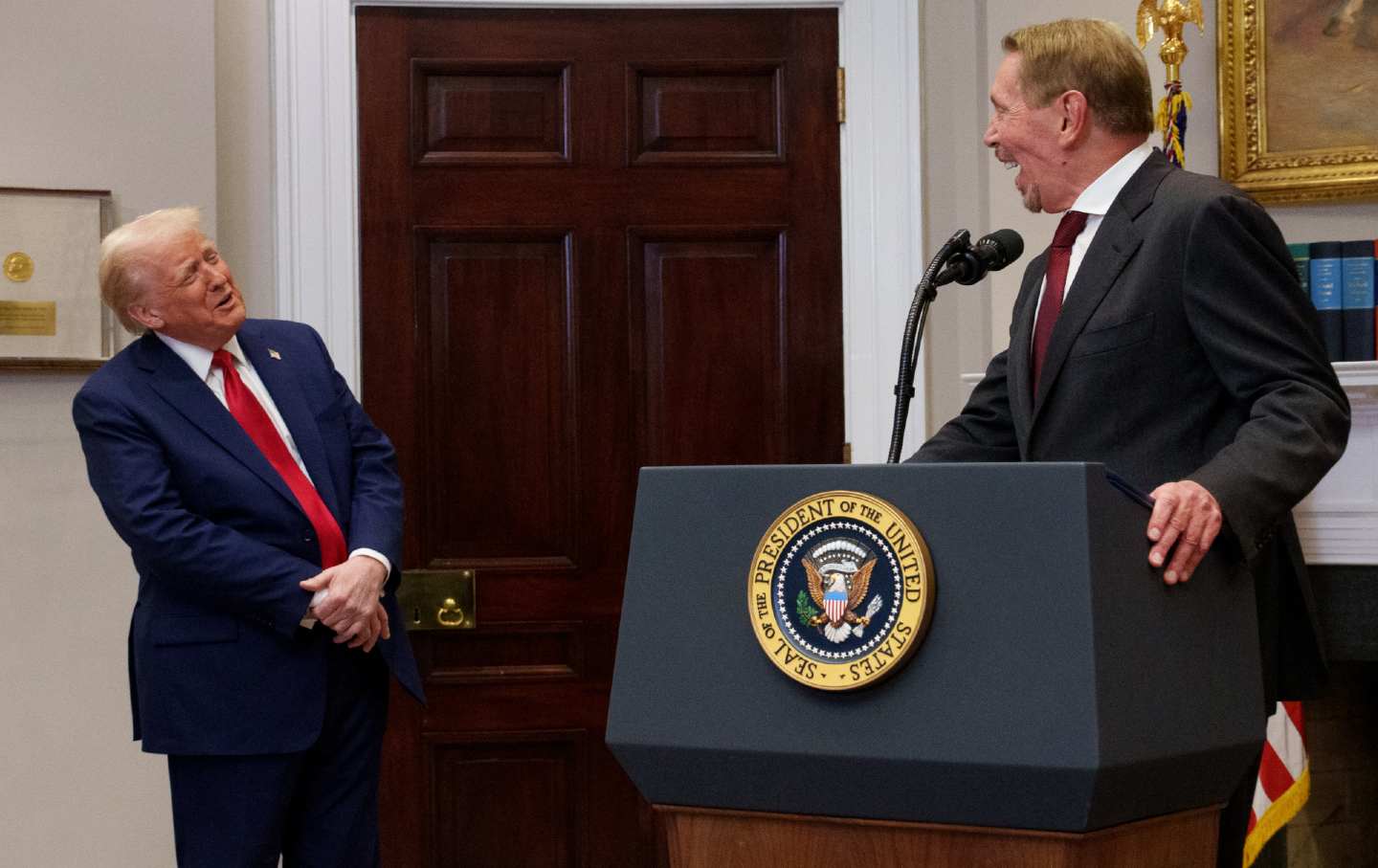Economy / October 10, 2025
Revising Section 230 of the 1996 Communications Decency Act would make outlets more accountable for the content they platform.

Oracle CEO Larry Ellison, who now holds major stakes in TikTok and CBS News, shares a laugh with President Donald Trump at the White House in January.
(Andrew Harnik / Getty Images)
In case people missed it, the final chapter of the long saga of the law forcing China to surrender control of TikTok was resolved by turning over a leading role to Oracle billionaire Larry Ellison. For people not familiar with Ellison, he is racing with Elon Musk for the status of being the richest person in the world. He is also a staunch right-winger and Trump ally, which likely goes far to explain the outcome of the TikTok marathon.
With Ellison in control of TikTok, we now have right-wingers or loony far-right wingers in control of most of the major social media platforms. Via his Meta conglomerate, newly macho man and Trump buddy Mark Zuckerberg controls Facebook and Instagram, which are used by 56.5 percent and 54.5 percent of Internet consumers, respectively.
Then we have TikTok, now controlled by Ellison, which 35.6 percent of Internet customers claim to use. And then there is X, formerly Twitter, which is controlled by mega MAGA nut job Elon Musk, which is used by 29.1 percent of Internet customers.
There are some other platforms that crack the top 10. YouTube rivals Facebook, with 55.3 percent of Internet customers saying they use it—and YouTube, owned by Google, is a notorious breeding ground for right-wing agitprop. WhatsApp, another Meta property, also ranks high with 54 percent of Internet customers saying they use it.
Clearly, the MAGA crowd are now the major players on digital and social-media platforms. And now, a significant stretch of traditional media has also come under their sway. Larry Ellison’s son, David, who shares his politics, now controls CBS through his ownership of Paramount—and has elevated ace right-wing troller Bari Weiss into the top spot at CBS News. The senior Ellison is also positioned to get control of CNN through a merger with its parent company. Other traditional outlets are losing audiences or also being taken over by other right-wing billionaires, so social media is an increasingly important alternative source of information.
This is why we should be very worried about this right-wing gang of three taking the helm of three massive social media platforms. They are now able to decide which posts are amplified to millions or even hundreds of millions of people They can suppress the circulation of views they don’t agree with and facts they don’t like or even ban them altogether. These are private platforms; it’s their ballgame. The results of this ideological swing are now on regular display at outlets such as Facebook and X.
It would have been good to prevent this sort of consolidation of media and social media outlets in the hands of the right. Progressives, bizarrely, have paid far more attention to campaign finance reform than to media reform, acting as though the ads candidates buy with their big bucks affect votes but the material people see between the ads doesn’t.
We can’t change the past, but we can think of useful routes going forward. And reforming Section 230 might be the most promising path.
Section 230 is part of the 1996 Communications Decency Act. It exempts social media platforms from liability for hosting third-party content. This means that, unlike print or broadcast media, which can be sued for spreading defamatory material, the giant social media platforms have no such concerns.
Fox News ended up paying $787 million to Dominion to settle a suit over the claim that it spread defamatory claims about Dominion’s voting machines in the 2020 election. Fox News was held responsible even for claims from people who were guests on their shows, not just statements by their paid staff.
By contrast, if Elon Musk chose to amplify nutty claims about Dominion, so we all saw them any time we clicked on to his platform, Section 230 means that he could not be sued. This makes little sense.
The logic of holding a platform responsible in the same way as a traditional media outlet is that they both amplify the damage of a defamatory claim and profit from it. If someone stands on a street corner and yells falsely that a restaurant gave him food poisoning, it probably doesn’t harm the restaurant much. But if the same person buys an ad on Facebook, and has it distributed to millions of people, it could do the restaurant serious harm. Why should Facebook be allowed to profit from defaming a restaurant?
The same issue arises even if the defamatory claim is not in a paid ad. These platforms make money by selling ads. If they can increase their viewership by posting whack-job claims, they can also profit from spreading defamatory material even if they are not directly paid to carry it.
The argument against holding platforms liable is that they can’t possibly screen the hundreds of millions of items that get posted daily. This is true, but there is an obvious solution that can be stolen from 1998 Digital Millennium Copyright Act (DCMA).
The DCMA was the mechanism for applying copyright law to the Internet. Since it would be impossible for websites to screen in advance for infringing material, the law requires that sites respond quickly to takedown notices in order to protect themselves against potential liability for copyright infringement.
It would be possible to amend Section 230 to have a similar takedown requirement. The law could require that the notice specify how the material is defamatory, and how it can be shown to not be true. The platform would then have the opportunity to review the argument and make a decision about whether to remove the material. If it chose not to, it would risk a defamation suit.
There could be some tough calls, and affected platforms might decide to over-remove just to be safe. This is also a problem with the DCMA. But this is the same problem that print and broadcast media face every single day. There is no reason to assume that Elon Musk and Mark Zuckerberg are so much less competent than the people making these calls at CNN or The New York Times. This would just be applying the same standard to all media.
Imposing this liability would be an additional cost for the platforms. They would need to hire people to review takedown notices and lawyers to ultimately make the call, but we apparently have no problem imposing these costs on other media.
The revision to Section 230 can also be used as an equalizer. There is a huge network effect with social media. People want to be on Facebook and TikTok because everyone else is on Facebook and TikTok. That’s why these platforms get so huge.
But a revision to Section 230 can be structured to apply a different liability rule to platforms that rely on advertising or selling personal information, like these giants, from the standard for other sites that might get by on subscriptions or donations. The new liability rule could exempt this latter group so that they can continue to operate as they do now, with no fear of defamation suits for third-party content.
This would give smaller sites an advantage, not only via lower costs; they could also benefit from abusive behavior by the giants. If Musk or Zuckerberg started removing any posts that didn’t properly genuflect to Donald Trump, ostensibly for fear of lawsuits, users would find refuge at the sites that had no such fears. This could prove to be an effective way to downsize these giants and reduce the power of Trump trio.
Popular
“swipe left below to view more authors”Swipe →
Will this change in liability laws make much difference in the structure of social media? I don’t know. An acquaintance who knows the social media landscape much better than I do has confidently assured me that it would make no difference; the giants would just hire a few more lawyers. Another very knowledgeable person insisted that the giants could not survive in their current form without Section 230 protection. He said that they would have to move to a subscription model.
My own guess is that the giants would keep their current model, but they would find having to deal with the risk of defamation suits to be a serious cost. They likely would overreact and frequently remove posts that are not defamatory. That would cause many people to switch to sites not controlled by the gang of three, where they could freely express their views.
But let’s just acknowledge that any guesses here are speculative. A change in rules still seems a clear gain. After all, why should Elon Musk be able to expand his fortune by spreading lies about people he doesn’t like?
A Republican Congress, with Trump as president, is not going to support a modification of Section 230 that will hurt his friends’ ability to dominate public debate. But we can and should get it on our to-do list for when Democrats do eventually get back into power. And in the meantime, we can recognize the protections of Section 230 as yet one more way the market has been rigged to benefit the rich.
Dean Baker
Dean Baker, senior economist at the Center for Economic and Policy Research, is the author of Rigged: How Globalization and the Rules of the Modern Economy Were Structured to Make the Rich Richer, and coauthor (with Jared Bernstein) of Getting Back to Full Employment: A Better Bargain for Working People.






